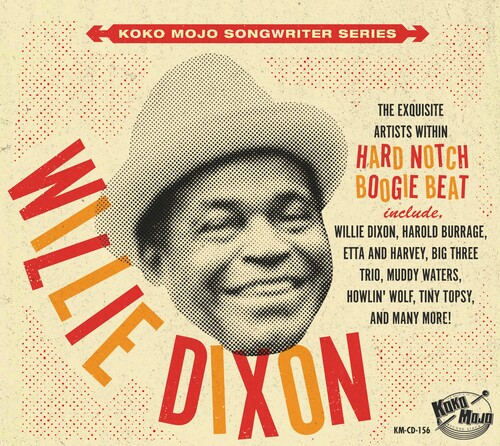Show results for
Explore
In Stock
Artists
Actors
Authors
Format
Theme
Category
Genre
Rated
Label
Specialty
Decades
Size
Color
Deals
- 4K Ultra HD Sale
- Action Sale
- Alternative Rock Sale
- Anime sale
- Award Winners Sale
- Bear Family Sale
- Blu ray Sale
- Blu ray Special Editions
- Blues on Sale
- British Sale
- Classical Music Sale
- Comedy Music Sale
- Comedy Sale
- Country Sale
- Criterion Sale
- Electronic Music sale
- Hard Rock and Metal Sale
- Horror Sci fi Sale
- Kids and Family Sale
- Metal Sale
- Music Video Sale
- Musicals on Sale
- Mystery Sale
- Naxos Label Sale
- Page to Screen Sale
- Rap and Hip Hop Sale
- Reggae Sale
- Rock
- Rock and Pop Sale
- Rock Legends
- Soul Music Sale
- TV Sale
- Vinyl on Sale
- War Films and Westerns on Sale

Willie Dixon Hard Notch Boogie Beat (Various Artists)
- Artist: Various Artists
- Format: CD
- Release Date: 4/1/2022

Willie Dixon Hard Notch Boogie Beat (Various Artists)
- Artist: Various Artists
- Format: CD
- Release Date: 4/1/2022
- Artist: Various Artists
- Label: Koko-Mojo
- UPC: 4260072729711
- Item #: 2467651X
- Genre: Pop
- Release Date: 4/1/2022

Product Notes
Rhythm & Blues music without the contribution of Willie Dixon is unimaginable. The Songwriter series looks at the craftmanship of Vicksburg, Mississippi-bred musician and song writer William (Willie) James Dixon who helped define the West-side sound created in the Chicago based studios." The musically journey in Willie Dixon, Hard Notch Boogie Beat (KM-CD-156) explodes into action in 1947 and boogies through to 1962. The album is filled to abundance with up-tempo boogie-blues, energetic rhythm & blues and some sultry female R&B divas add to the all-round look at his influence on popular music. Dixon who was one of the greatest bassets and song writers in the world and he is featured with six recordings from his tenure with the Big Three Trio, two solo recordings, and one duet with Memphis Slim. He additionally performs as session basset on many of the album's songs, and the sleeve notes provide this information. The album has a strong focus on his prime period was with the Chicago labels, Chess, Checker and Cobra. The Big Three Trio first recorded for Bluebird; however, our story begins with the Bullet, Columbia, and Okeh labels. The featured Trio recordings are perfect examples of the transformation of post-war R&B music. The Big Three Trio comprised of; pianist Leonard "Baby Doo" Caston, guitarist Bernardo Dennis (who was replaced after a year by Ollie Crawford), and upright bassist Dixon, and the trio sang ensemble. Signifying Monkey, 88 Boogie, Hard Notch Boogie Beat, and the other three Trio recordings are full of rhythm patterns which are the roots of rock 'n' roll.
Credits
-
Artist(s)Various Artists

